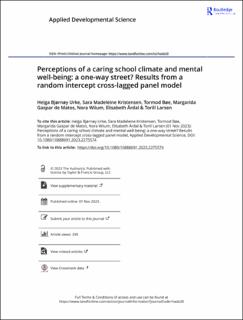| dc.contributor.author | Urke, Helga Bjørnøy | |
| dc.contributor.author | Kristensen, Sara Madeleine | |
| dc.contributor.author | Bøe, Tormod | |
| dc.contributor.author | Gaspar de Matos, Margarida | |
| dc.contributor.author | Wiium, Nora | |
| dc.contributor.author | Årdal, Elisabeth | |
| dc.contributor.author | Larsen, Torill Marie Bogsnes | |
| dc.date.accessioned | 2024-01-26T12:14:03Z | |
| dc.date.available | 2024-01-26T12:14:03Z | |
| dc.date.created | 2023-11-23T12:57:04Z | |
| dc.date.issued | 2023 | |
| dc.identifier.citation | Applied Developmental Science. 2023 | en_US |
| dc.identifier.issn | 1088-8691 | |
| dc.identifier.uri | https://hdl.handle.net/11250/3114082 | |
| dc.description | This is an Open Access article distributed under the terms of the Creative Commons Attribution License (http://creativecommons.org/licenses/by/4.0/), which permits unrestricted use, distribution, and reproduction in any medium, provided the original work is properly cited. The terms on which this article has been published allow the posting of the Accepted Manuscript in a repository by the author(s) or with their consent. | en_US |
| dc.description.abstract | We investigated the between- and within-person longitudinal relationship between perceptions of a caring school climate and mental well-being, and the role of socioeconomic position (SEP) for these constructs among high school students in Norway (N = 1508; 60.7% girls). Using a random intercept cross-lagged panel model, we found positive concurrent associations between perceptions of a caring school climate and mental well-being at both between and within levels, and positive cross-lagged effects at the within-person level from mental well-being to later perceptions of a caring school climate across all time points. SEP was positively associated with mental well-being at time one, and at all time points with perceptions of a caring school climate. The findings suggest that mental well-being is a significant contributor to how Norwegian adolescents subsequently perceive their school context, and underscore the importance of school staff being particularly attentive toward students who struggle with mental health, as well as those with lower SEP. | en_US |
| dc.language.iso | eng | en_US |
| dc.publisher | Taylor & Francis | en_US |
| dc.rights | Navngivelse 4.0 Internasjonal | * |
| dc.rights.uri | http://creativecommons.org/licenses/by/4.0/deed.no | * |
| dc.subject | caring school climate | en_US |
| dc.subject | mental well-being | en_US |
| dc.title | Perceptions of a caring school climate and mental well-being: a one-way street? Results from a random intercept cross-lagged panel model | en_US |
| dc.type | Peer reviewed | en_US |
| dc.type | Journal article | en_US |
| dc.description.version | publishedVersion | en_US |
| dc.rights.holder | © 2023 The Author(s). Published with license by Taylor & Francis Group, LLC | en_US |
| dc.source.pagenumber | 1-15 | en_US |
| dc.source.journal | Applied Developmental Science | en_US |
| dc.identifier.doi | 10.1080/10888691.2023.2275574 | |
| dc.identifier.cristin | 2201000 | |
| dc.relation.project | Norges forskningsråd: 302225 | en_US |
| dc.relation.project | Kunnskapsdepartementet: 20161789 | en_US |
| cristin.ispublished | true | |
| cristin.fulltext | original | |
| cristin.qualitycode | 1 | |

